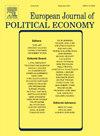Fines for unequal societies
IF 2.4
3区 经济学
Q2 ECONOMICS
引用次数: 0
Abstract
One fourth of the 196 countries we surveyed adopts some form of day fines — that is, fines that increase with the wealth of the offender — and does so for moderate, non-monetary violations. We offer a model of optimal deterrence with decreasing marginal utility of wealth and unequal wealth distribution that rationalizes this pattern. We show that uniform fines are optimal when harm from crime is low, non-monetary sanctions when it is high, and day fines in the intermediate region. The introduction of day fines reduces the (optimal) use of non-monetary sanctions and restores deterrence for the rich, as compared to uniform fines. The scope for day fines increases with wealth inequality and decreases with the cost of wealth verification.
对不平等社会的罚款
在我们调查的196个国家中,有四分之一的国家采用了某种形式的日罚款——即随着违法者财富的增加而增加的罚款——并且是针对温和的、非金钱违规行为。我们提出了一个财富边际效用递减和财富分配不平等的最优威慑模型,使这种模式合理化。我们发现,当犯罪危害较低时,统一罚款是最优的;当犯罪危害较高时,非货币性制裁是最优的;在中间区域,日间罚款是最优的。与统一罚款相比,日罚款的引入减少了非货币制裁的(最佳)使用,并恢复了对富人的威慑。日罚款的范围随着财富不平等而增加,随着财富核查的成本而减少。
本文章由计算机程序翻译,如有差异,请以英文原文为准。
求助全文
约1分钟内获得全文
求助全文
来源期刊

European Journal of Political Economy
Multiple-
CiteScore
3.40
自引率
10.00%
发文量
106
期刊介绍:
The aim of the European Journal of Political Economy is to disseminate original theoretical and empirical research on economic phenomena within a scope that encompasses collective decision making, political behavior, and the role of institutions. Contributions are invited from the international community of researchers. Manuscripts must be published in English. Starting 2008, the European Journal of Political Economy is indexed in the Social Sciences Citation Index published by Thomson Scientific (formerly ISI).
 求助内容:
求助内容: 应助结果提醒方式:
应助结果提醒方式:


